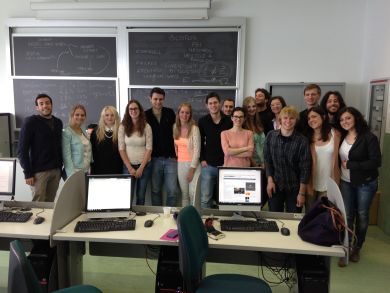
Gli studenti della Scuola di Giornalismo Walter Tobagi insieme agli allievi della Fontys Hogeschool voor de Journalistiek, 28 maggio 2013
Mantenendo sempre alta l’attenzione verso la prospettiva globale, gli allievi della Scuola di Giornalismo Walter Tobagi hanno incontrato il 28 maggio un gruppo di studenti olandesi della Fontys Hogeschool voor de Journakistiek di Tilburg. Ragazzi e ragazze che rimarranno a Milano per una settimana, durante la quale si dedicheranno a varie esercitazioni giornalistiche. In particolare, durante il loro soggiorno dovranno scrivere articoli e realizzare un video su una Milano più alternativa, concentrandosi soprattutto sugli aspetti sconosciuti della vita culturale e artistica del capoluogo lombardo.
Il viaggio ha come scopo la preparazione del progetto da presentare alla fine del quarto semestre del primo anno della laurea. 8 ragazzi e ragazze dell’età tra 17 e 22 anni sono stati selezionati per realizzare un reportage su Milano, mentre altri studenti della Fontys Hogeschool, circa una centinaia, sono partiti alla volta di diverse città europee, tra cui Parigi, Berlino e Stoccolma. Questo tour europeo è completamente a carico degli studenti e sono stati loro stessi a pianificare il viaggio.
Gli studenti della Walter Tobagi hanno pensato a dare una mano ai colleghi per ambientarsi a Milano, usando questo incontro come un’occasione per uno scambio di esperienze. I ragazzi olandesi hanno intervistato alcuni studenti della Scuola Walter Tobagi per discutere una serie di questioni caldi in agenda del giornalismo globale. Come hanno raccontato, i giovani giornalisti in Olanda affrontano dei problemi molto simili quelli vissuti dai loro colleghi in Italia, ossia la precarietà sul lavoro e bassi compensi percepiti dai collaboratori esterni delle testate. Ma nonostante la profonda crisi del giornalismo olandese, l’online offre molte speranze alle nuove leve. Il problema principale, secondo gli studenti olandesi, è che continua ad essere percepito come un format inferiore rispetto ai media tradizionali, con conseguenze ovvie sugli stipendi dei giornalisti. In più, spesso manca un modello di business consistente. Allo stesso tempo i social network stanno acquistando sempre maggiore importanza e in molti casi vengono utilizzati dai colleghi olandesi come una delle fonti primari delle notizie.
Anna Lesnevskaya
Dutch journalism students visit Walter Tobagi School
On the agenda are the hot issues of reporting to discuss with the Italian colleagues
Journalism goes global with Walter Tobagi Journalism School students meeting on May 28 a group of Dutch journalism students from the Fontys Hogeschool voor de Journakistiek in Tilburg. The Dutch students are staying in Milan for a week, dedicating themselves to exercising their journalism skills. During their stay they are to write articles and make a video reportage on an alternative side of Milan, focusing themselves on hidden aspects of Milan cultural and artistic life. The trip makes part of a journalistic assignment they are to prepare for the fourth semester of the first year of their studies. While 8 young people aged between 17 and 22 were selected to report on Milan, others of more than a hundred students of Fontys Hogeschool set for all kinds of European cities, like Paris, Berlin or Stockholm. This European tour is completely self-funded and also all the trip preparations were managed by the students themselves.
Walter Tobagi Students are helping the Dutch students to get around in Milan, having a chance to exchange their experiences. The issues raised in a series of face to face interviews conducted by the Dutch colleagues regarded some hot topics on the journalistic agenda. As the Dutch students told, the young reporters in Netherlands are facing quite similar kinds of problems as the Italian ones: that is a lack of job security, with young freelance journalists getting very often underpaid. But in spite of a deep crisis hitting Dutch journalism, online media seems to offer new prospects for the new generations of reporters in Netherlands. The problem is, as the Dutch students stated, online journalism is considered to be inferior to the traditional media, which has its repercussions on the reporter’s wages, and in many cases the business model is still to be worked out. Social networks then are getting more and more importance for the reporters in Netherlands, and very often they become a primary source of news for the Dutch colleagues.
Anna Lesnevskaya





